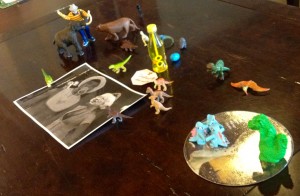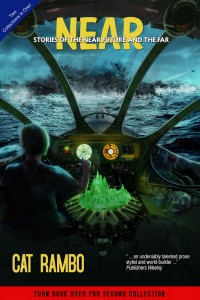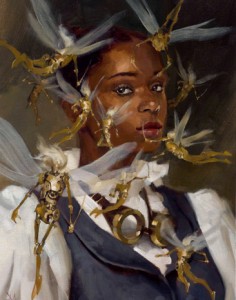
Someday I hope to have my students greet me with tiny classroom dioramas too. Perhaps not as many dinosaurs as Connie merits.
But words are imprecise things, and so I’m a-gonna do what we used to call “unpacking” back in grad school and even provide some useful examples.
What did Connie say? She said, “Good fiction teaches us what it means to be human.” As good f&sf writers, I would argue that we might change “human” to “self-aware being,” but that is picking nits.
So what does that mean? It means we’re all faced with this common problem: life. And we want to know what we’re supposed to do, and what we can get away with, and what to do about all that hardcoded primate behavior that keeps popping up from time to time, and stuff like that. Sometimes the message features a universal human, sometimes it is a human shaped by particular circumstances, such as race, gender, class, sexuality, disability, etc. It’s why we like to read fiction. It’s why we like gossip. We want to know what other human beings do.
And here’s why this is important: Sometimes thinking about what a story is trying to say is a good way to complete, rewrite, or sharpen it. Doing this at one of those stages can move a story from good to excellent. Do I start a story knowing the message? Hell no. It emerges (hopefully). Sometimes I have to coax it out of its hiding place in the prose. Sometimes I have to go in with a club.
But what are some examples of messages? This is my blog and so I am going to be lazy and pull examples from my own work. Here’s some easy ones:
- Worm Within – Sometimes people go crazy and can’t trust their own perceptions.
- Whose Face This Is, I Do Not Know – Sometimes we take our cues to appear a certain way from other people and it’s not usually a survival trait.
- Bus Ride to Mars – What’s this dying thing all about and will stories carry us through?
- Lost in Drowsy Dreams – Jealousy leads to sad moments.
- The Immortality Game – Daydreaming and wishing about the past is a futile and sometimes narcissistic activity.
- Love Resurrected – You don’t always get what you want in love and sometimes if you do, you will regret it.
- Clockwork Fairies – Differing viewpoints of the world can present difficulties in love
- Ms. Liberty Gets A Haircut – Feminism is complicated.
- And the current piece I’m finishing up – Addiction will twist your life in strange ways.
Can you do this with every story? Maybe. There’s some of mine that I’d have a hard time doing this with, but I don’t know whether the problem is my own blinders, a lack on the part of the story, or just something that happens sometime.
Thoughts? How easy is it for you to figure out what your stories want to say? And when you find that out, what do you do with it?
(And shouts out to my peep Ann Leckie, who also edits the fine online fiction magazine Giganotasaurus, on the book deal!! Go Ann, you rock!!)
Enjoy this writing advice and want more content like it? Check out the classes Cat gives via the Rambo Academy for Wayward Writers, which offers both on-demand and live online writing classes for fantasy and science fiction writers from Cat and other authors, including Ann Leckie, Seanan McGuire, Fran Wilde and other talents! All classes include three free slots.
Prefer to opt for weekly interaction, advice, opportunities to ask questions, and access to the Chez Rambo Discord community and critique group? Check out Cat’s Patreon. Or sample her writing here.






